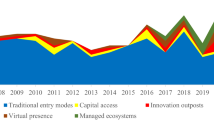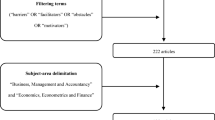Abstract
We outline a model that improves our understanding of the role of incubators in the entrepreneurial process. Specifically, we focus on the impact of the services offered, namely infrastructure, coaching and networks, on the graduation rates of the respective incubators' tenants. The model is tested among three different types of incubators, for-profit, non-profit, university-based incubators. Based on our qualitative findings, we conclude that our initial model is ineffective, in the sense that it cannot fully explain the role of the incubators in facilitating entrepreneurship. Interviews with directors of incubator centers were also carried out simultaneously. Further analysis of the results along with interview responses from incubator directors, led us to propose a more comprehensive model to explain how incubators affect the entrepreneurial process.
Similar content being viewed by others
References
Aldrich, H.E., 1999, Organizations Evolving, Thousand Oaks, CA: Sage Publications.
Aldrich, H.E. and D. Whetten, 1981, 'Making the Most of Simplicity: Organization Sets, Action Sets and Networks,' in P. Nystrom and William H. Starbuck (eds.), Handbook of Organizational Design, New York: Oxford University Press, pp. 386-405.
Allen D. and M.A. Dougherty, 1987, 'The Business Incubator Industry in 1987,' Proceedings U.S.A.S.B.E., Milwaukee, October, p. 2.
Allen, D., 1985, Small Business Incubators and Enterprise Development. Reports prepared for the U.S. Department of Commerce, Pennsylvania State University.
Allen, D.N. and S. Kahman, 1985, 'Small Business Incubators: A Positive Environment for Entrepreneurship,' Journal of Small Business Management 23(3), 12-22.
Almeida, P., G. Dokko, and, L. Rosenkopf, 2002, 'Start-up Size and the Mechanisms of External Learning: Increasing Opportunity and Decreasing Ability,' Working paper, Washington, DC, USA: Georgetown University.
Barney, J.B., 1986, 'Organization Culture: Can It Be a Source of Sustained Competitive Advantage,' Academy of Management Review 11(3), 656-665.
Barney, J., 1991, 'Firm Resources and Sustained Competitive Advantage,' Journal of Management 17(1), 99-120.
Barney J.B., 2001, 'Is the Resource-Based “View” a Useful Perspective for Strategic Management Research? Yes,' Academy of Management Review 26(1), 41-56.
Baron, R. A. and S. A. Shane, 2004, Entrepreneurship: A Process Perspective, Southwest/Thomson, Cincinnati.
Bhave, M.P., 1994, 'A Process Model of Entrepreneurial Venture Creation,' Journal of Business Venturing 9, 223-242.
Burgelman, R., 1980, 'Managing Innovating Systems: A Study of the Process of Internal Corporate Venturing,' Ph.D., thesis Columbia University.
Burt, R.S., 1992, Structural Holes: The Social Structure of Competition, Cambridge MA: Harvard University Press.
Bygrave, W.D. and C.W. Hofer, 1991, 'Theorizing about Entrepreneurship,' Entrepreneurship Theory and Practice 16(2), 13-22.
Cambell, C.J., J.J. Borge, and K. Olen, 1988, Change Agents in the New Economy: Business Incubators and Economic Development, Minneapolis, MN: University of Minnesota.
Cohen, W. and D. Levinthal, 1990, 'Absorptive Capacity: A New Perspective on Learning and Innovation,' Administrative Science Quarterly 35, 128-152.
Colombo, M.G. and M. Delmastro, 2002, 'How Effective are Technology Incubators? Evidence from Italy,' Research Policy 31(7), 1103-1122.
Cunningham, M.R., 1999, 'Preparing Biotechnology Leaders of the Future,' Managing Intellectual Property 89, 18-26.
Drucker, P.F., 1985, Innovation and Entrepreneurship: Practices and Principles, Oxford, Butterworth: Heinemann.
Eisenhardt, K., 2000, 'Dynamic Capabilities. What They Are?,' Strategic Management Journal 21(10/11), 1105-1122.
Entrepreneurs: Be Careful When Choosing a Business Incubator, SCOR Report, 10746498, November 2000, 7(13).
European Union, 1994, European Community: Business Innovation Centres Observatory, Brussels: European Business and Innovation center Network, EU Comission.
Fast, N.D., 1981, 'Pitfalls of Corporate Venturing,' Research Management 24(2), 21-24.
Finer, B. and P. Holberton, 2002, 'Incubators: There and Back,' Journal of Business Strategy 23(3), 21-24.
Galante, S.P., 1987, 'Business Incubators Adopting Niche Strategies to Stand Out,' Wall Street Journal 13, 1.
Garnsey, E.W., S.C. Galloway, and S.H. Mathisen, 1994, Flexibility and Specialization in Question: Birth, Growth and Death Rates of Cambridge New Technology Based Firms 1988–92, Entrepreneurship and Regional Development 6, 81-107.
George, G., A.Z. Shaker, and D.R. Wood, 2002, 'The Effects of Business-University Alliances on Innovative Output and Financial Performance: A Study of Publicly Traded Biotechnology Companies,' Journal of Business Venturing 17, 577-609.
Gnyawali, D. and D. Fogel, 1994, 'Environments for Entrepreneurship Developments: Key Dimensions and Research Implications,' Entrepreneurship Theory and Practice 18(4), 43-63.
Granovetter, M., 1974, Getting a Job: A Study of Contracts and Careers, Cambridge, MA: Harvard University Press.
Grant, R.M., 1991, 'The Resource-Based Theory of Competitive Advantage: Implications for Strategy Formulation,' California Management Review 33(3), 114, 22.
Hansen, M.T., H. Chesbrough, N. Nohria, and D.S. Sull, 2000, 'Networked Incubators: Hothouses of the New Economy,' Harvard Business Review 78(5), 74-84.
Haugen, T.M., 1990, 'Getting a Head Start: The Rise of Business Incubators,' Business Forum 15,(1).
Herron, L. and H.J. Sapienza, 1992, 'The Entrepreneur and the Initiation of New Venture Launch Activities,' Entrepreneurship Theory and Practice 17(1), 49-55.
Hickman, C. and C. Raia, 2002, 'Incubating Innovation,' Journal of Business Strategy May/June 23(3), 14-18.
Hills, G. and G. Lumpkin, 1997, Opportunity Recognition Research: Implications for Entrepreneurship Education, Paper presented at IntEnt 97. The 1997 International Entrepreneurship Conference. Monterey Bay: California, U.S.A., June 1997.
Kirzner, I.M., 1973, Competition and Entrepreneurship, Chicago, IL: University of Chicago Press.
Kirzner, I.M., 1979, Perception, Opportunity, and Profit, Chicago: University of Chicago Press.
Kourilsky, M.L., 1995, Entrepreneurship Education: Opportunity in Search of Curriculum, Kansas City, MO: Center for Entrepreneurial Leadership, Ewing Marion Kauffman Foundation, pp. 1-21.
Lalkaka, R., 2002, 'Technology Business Incubators to Help Build an Innovation-Based Economy,' Journal of Change Management 3(2), 167-176
Leifer, R.D., M. McDermott, G.C. O'Connor, L.S. Peters, M. Rice, and R.W. Veryzer, 2000, Radical Innovation: How Mature Companies Can Outsmart Upstarts, Harvard Business School Press, 258 pp.
Levitt, B. and J. March, 1988, 'Organizational Learning,' Annual Review of Sociology 14, 319-40.
Looking for an incubator?, NZ Business, 01134957, August 2001, 15(7).
Moingeon, B. and A. Edmondson, 1996, Organizational Learning and Competitive Advantage, London: Sage Publications.
Nowak, M.J. and E.G. Charles, 2000, 'The Virtual Incubator: Managing Human Capital in the Software Industry,' Research Policy 29, 125-134.
O'Connor, G.C. M.P. Rice, L.S. Peters, and R.W. Veryzer, 2003, 'Managing Interdisciplinary, Longitudinal Research on Radical Innovation: Methods for the Study of Complex Phenomena,' Organization Science 14(4), 353-374.
Peters, L.S. and H.I. Fusfeld, 1982, Current U.S. University-Industry Research Connections, NSB-2.
Peters, L.S. and G.C. O'Connor, 2002, 'Building the Capacity for Change: Radical Innovation and New Product Development in the Multinational Firm,' in IEMC 2002 Managing Technology for the New Economy Proceedings, Cambridge, U.K., 2, 612-616.
Peters, L.S. and P. Wheeler, 1988, 'Technology-Based Regional Development: An Overview,' Center for Science and Technology Policy, Rensselaer Polytechnic Institute.
Pinchot. Gifford III. 1985, Intrapreneuring: Why You Don't Have to Leave the Corporation to Become an Entrepreneur, New York: Harper and Row.
Rice, M., 2002, 'Co-production of Business Assistance in Business Incubators: An Exploratory Study,' Journal of Business Venturing March, 17(2), 163-187.
Rice, M.P. and J.B. Matthews, 1995, Growing New Ventures—Creating New Jobs: Principles and Practices of Successful Business Incubation, Westport, Connecticut: Quorum Books.
Roberts, E.B., 1980, 'New Ventures for Corporate Growth,' Harvard Business Review July/August, 134-142.
Roper, S., 1999, 'Israel's Technology Incubators: Repeatable Success or Costly Failure,' Regional Studies 33(2), 175-180.
Roper, S. and D. Hewitt, 1998, 'Grant Assistance and Small Firm Development in Northern Ireland and the Republic of Ireland,' Working paper 38, Northern Ireland economic Research center, Queen's University of Belfast.
Schumpeter, 1989, Essays on Entrepreneurs, Innovations, Business Cycles and the Evolution of Capitalism, New Brunswick: Transaction Publishers.
Shane, S. and S. Ventakaraman, 2000, 'The Promise of Entrepreneurship as a Field of Research,' Academy of Management Review 25, 217-226.
Smilor, R.W., 1987, 'Commercializing Technology Through New Business Incubators,' Research Management 30(5), 36-41.
Steier, L. and R. Greenwood, 1995, 'Venture Capital Relationships in the Deal Structuring and Post-Investment Stages of New Firm Creation,' Journal of Management Studies 32(3), 337-357.
Teece, D.J. G. Pisano, and Shuen, 1997, 'Firm Capabilities, Resources and Strategy,' CCC Working Paper 908, Centre for Research in Management, University of California at Berkeley. Smilor: 146.
Timmons, J.A., 1994, New Venture Creation: Entrepreneurship, for the 21st Century (4th edition), Homewood, IL: Irwin.
Ventakaraman, S., 1997, 'The Distinctive Domain of Entrepreneurship Research,' in J. Katz (ed.), Advances in Entrepreneurship: Firm Emergence and Growth, 3, 119-138.
Williamson, O., 1985, The Economic Institutions of Capitalism, New York: Free Press.
Wenger, E., 1998, Communities of Practice, Learning, Meaning, and Identity, Cambridge, U.K.: Cambridge University Press.
Wiggens, J. and D.V. Gibson, 2003, 'Overview of US Incubators and the Case of the Austin Technology Incubator,' International Journal of Entrepreneurship and Innovation Management 3(1.2), 56.
Wynarzyck, P., R. Watson, D.J. Storey, H. Short, and K. Keasey, 1993, The Managerial Labor Market in Small and Medium Sized Enterprises, London: Routledge.
Yunos, M. G. M., 2002, 'Building an Innovation-based Economy: The Malaysian Technology Business Incubator Experience,' Journal of Change Management 3(2), 177-188.
Author information
Authors and Affiliations
Rights and permissions
About this article
Cite this article
Peters, L., Rice, M. & Sundararajan, M. The Role of Incubators in the Entrepreneurial Process. The Journal of Technology Transfer 29, 83–91 (2004). https://doi.org/10.1023/B:JOTT.0000011182.82350.df
Issue Date:
DOI: https://doi.org/10.1023/B:JOTT.0000011182.82350.df




